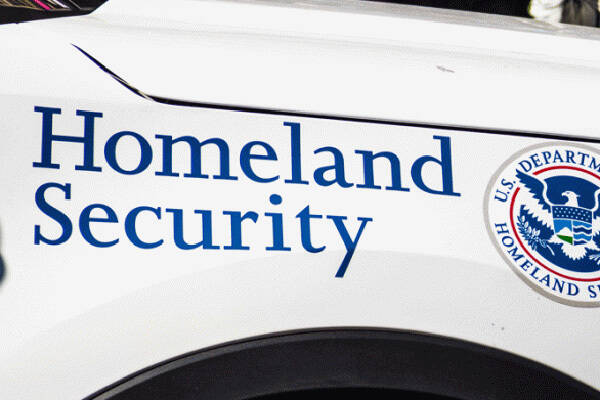Get Started on Your Future with a Homeland Security Degree
Interested in the field of homeland security?
Whether it's through the military, civilian employment, or an internship, having direct experience may aid you in standing out from the crowd.
We can help you explore different education options and offer guidance on the steps needed to prepare you for professional responsibilities in the important field of homeland security. There are several homeland security degree programs we offer at American Public University, including our bachelor's degree and master's degree programs.
Top Homeland Security Degrees
All Related Programs

A Brief History of Homeland Security
The U.S. Department of Homeland Security (DHS) was created in response to the 9/11 terrorist attacks in 2001. It was established on November 25, 2002, after the introduction of the Homeland Security Act.
The creation of the Department of Homeland Security was seen as a necessary step in improving our country's ability to respond to the evolving security threats of the 21st century.
The 9/11 attacks demonstrated the need for a unified and coordinated approach to national security, and the creation of a cabinet-level department was established as a result.
The act merged various government agencies into a single department with the primary purpose of enhancing the security of our country and its citizens.
The Department of Homeland Security has a range of responsibilities, including preventing terrorism, enhancing security, managing borders and immigration, protecting our nation's critical infrastructure and cyber networks, and responding to natural disasters and emergencies.
The Department of Homeland Security works with numerous federal, state, local, and private sector partners to achieve these goals.
Homeland Security: Getting Started
One of our homeland security degrees may help expand your knowledge.
Our programs cover various topics such as intelligence, emergency management, emergency preparedness, critical infrastructure protection, crisis management, international relations, and law enforcement. Other topics include risk management, legal issues, ethical issues, criminal justice, and border security breaches.
Homeland Security Communication Skills
People in the field of homeland security must present their analysis clearly and concisely to decision-makers. Therefore, excellent communication skills are vital.
Homeland security professionals may need to inform a variety of audiences, including policy makers, government agencies, and law enforcement officials. Consequently, being able to clearly convey information – in speech or in writing – is an essential skill.
A strong foundation in the principles and practices of homeland security may be gained by exploring some of the degrees and certificates we offer through our School of Security and Global Studies.
A homeland security degree can provide students with the knowledge, skills, and experience often required in this field.
There are a number of benefits to pursuing a bachelor's degree or master's degree. For example, a degree can provide individuals with a deep understanding of the challenges and issues facing our country.
This knowledge can be invaluable for adult learners looking to make a difference in the field.
A degree can also help to provide students with the skills they need to be effective leaders and decision-makers.
Homeland security professionals are often called upon to work in complex and challenging environments, and a strong educational background may help prepare individuals for these situations.
The degree program can help provide students with training in critical thinking, problem-solving, and leadership, which can be valuable assets.
Our Bachelor's Degree in Homeland Security
Our bachelor's in homeland security covers a multitude of disciplines related to the field and provides adult learners with an understanding of the threats and challenges posed by terrorism, natural disasters, cyberattacks, and other public safety issues that could threaten citizens or cause disruption to society.
In addition, with our bachelor's in homeland security, an undergraduate student can gain vital critical thinking skills and learn about the legal and political framework that govern domestic and international security measures.
While earning a bachelor's degree, students can also explore best-practice strategies to identify potential threats, develop countermeasures, and protect individuals, critical infrastructures, and resources.
Some of the courses available in our bachelor's degree in homeland security include:
- Emergency and Disaster Incident Command
- Risk Communications
- Chemical, Biological, and Radiological Hazards
- Law and Ethics in Intelligence
- Terrorism and Counterterrorism
- Private Sector Homeland Security
- Cybercrime
- Maritime Law
- Psychology of Disaster
- Intelligence Analysis
Our Master's Degree in Homeland Security
Our graduate degree helps to provide students with the knowledge and skills often required to protect a nation's citizens, infrastructure, and resources from potential terrorist threats.
This academic program covers a wide range of topics, including counter-terrorism, intelligence operations, cyber security, risk management, and emergency preparedness.
Courses cover the policies and legal aspects of homeland security, as well as practical skills such as surveillance techniques and terrorist attack responses.
Students will also analyze potential threats to national security from foreign countries and organizations.
This homeland security master's degree program is designed for current homeland security professionals.
The program also provides students with the opportunity to learn from our expert faculty members – many of which have real-world experience in the field.
There are various concentrations available in our master's degree in homeland security:
- General
- Business Administration
- Criminal Justice
- Emergency Management and Public Health
- Transportation Security
- Counter-Terrorism Studies
- Cyber
What Can a Student Learn with a Homeland Security Degree?
A degree in homeland security may help to provide students with the skills they need to make informed decisions that protect our nation’s safety and security.
Students who pursue a degree in this field can expect to develop excellent research methods, critical thinking skills, and theoretical and practical skills, all of which can be applicable to the field of homeland security. Courses may cover topics such as intelligence gathering, disaster preparedness, weapons of mass destruction, and terrorism networks.
In addition to understanding the legal and procedural framework of homeland security, students will gain a comprehensive understanding of the science behind these topics.
They may also be trained in emergency response procedures or receive instruction on crisis management and risk assessment.
By learning about these areas, students may develop a knowledgebase often necessary to be effective as security professionals.
Our online programs may help to prepare our students to respond quickly and efficiently to threats as they arise and help protect our nation’s safety and security.
By completing a degree in homeland security, students will be better equipped to face the challenges of our country’s future and make informed decisions that help safeguard the safety and wellbeing of all citizens.
Upon attaining their homeland security degree online, graduates can gain the knowledge, skills, and experience often needed to create secure systems, detect internal or external threats, and protect the nation’s safety.
Homeland Security Career Resources

Defining and Illustrating the Homeland Security Enterprise

Alumni Stories: Pursuing and Focusing on Homeland Security

View All Homeland Security Resources
Frequently Asked Questions
Homeland security refers to the collective efforts and strategies implemented to safeguard a nation's territory, citizens, and infrastructure from threats, including terrorism, natural disasters, and cyberattacks.
Homeland security focuses on protecting a nation's territory, citizens, and infrastructure from various threats within its borders, including terrorism, natural disasters, and cyberattacks. It involves proactive measures such as risk assessment, preparedness, and response coordination.
However, homeland defense is concerned with safeguarding a nation's sovereignty and territory from external threats. It involves military and defense operations aimed at preventing and countering attacks originating from outside the country's borders, including defense against conventional military aggression and asymmetric threats.
To sum it up, homeland security deals with threats within a nation's borders, while homeland defense addresses threats originating from outside those borders.
Some of the major agencies within the U.S. Department of Homeland Security include:
Transportation Security Administration (TSA): Responsible for securing transportation systems, including airports, seaports, and mass transit.
U.S. Customs and Border Protection (CBP): Oversees U.S. borders and ports of entry, including border security, customs, and immigration enforcement.
Federal Emergency Management Agency (FEMA): Coordinates response and recovery efforts to natural disasters, including providing disaster assistance and supporting state and local emergency management agencies.
Federal Law Enforcement Training Centers (FLETC): Provides training to the federal law enforcement community, helping officers fulfill their criminal justice responsibilities to ensure the safety of people, property, and institutions.
Immigration and Customs Enforcement (ICE): Enforces border control and customs laws, including investigating and detaining individuals who violate these laws.
United States Secret Service: Primarily responsible for protecting the president, vice president, and other high-ranking officials, as well as investigating financial crimes and protecting the nation's financial infrastructure.
Cybersecurity and Infrastructure Security Agency (CISA): Works to enhance cybersecurity and protect critical infrastructure from cyber threats.
U.S. Citizenship and Immigration Services (USCIS): Ensures lawful immigration to the United States and oversees the process for individuals who wish to seek U.S. citizenship.
U.S. Coast Guard: Protects maritime interests and enforces maritime laws, including search and rescue operations, drug interdiction, and maritime security.
A number of other offices and support services operate under DHS as well, including the Management Directorate, Science and Technology Directorate, Countering Weapons of Mass Destruction, Office of Intelligence and Analysis, Office of Homeland Security Situational Awareness, the Office of Health Security, and ombudsman offices.
Homeland Security works to improve the security of the United States. The federal division that manages this task is the Department of Homeland Security (DHS).
The work of DHS includes customs, border, and immigration enforcement, emergency response to natural and manufactured disasters, counter terrorism work, and cybersecurity.
The Department of Homeland Security was formed in the wake of the terrorist attacks of September 11, 2001, as part of a national effort to safeguard the United States against terrorism. DHS became the third-largest federal department, bringing together 22 different federal agencies, each with a role in this effort.
Some of the major agencies within the U.S. Department of Homeland Security include:
Transportation Security Administration (TSA): Responsible for securing transportation systems, including airports, seaports, and mass transit.
U.S. Customs and Border Protection (CBP): Oversees U.S. borders and ports of entry, including border security, customs, and immigration enforcement.
Federal Emergency Management Agency (FEMA): Coordinates response and recovery efforts to natural disasters, including providing disaster assistance and supporting state and local emergency management agencies.
Federal Law Enforcement Training Centers (FLETC): Provides training to the federal law enforcement community, helping officers fulfill their criminal justice responsibilities to ensure the safety of people, property, and institutions.
Immigration and Customs Enforcement (ICE): Enforces border control and customs laws, including investigating and detaining individuals who violate these laws.
United States Secret Service: Primarily responsible for protecting the president, vice president, and other high-ranking officials, as well as investigating financial crimes and protecting the nation's financial infrastructure.
Cybersecurity and Infrastructure Security Agency (CISA): Works to enhance cybersecurity and protect critical infrastructure from cyber threats.
U.S. Citizenship and Immigration Services (USCIS): Ensures lawful immigration to the United States and oversees the process for individuals who wish to seek U.S. citizenship.
U.S. Coast Guard: Protects maritime interests and enforces maritime laws, including search and rescue operations, drug interdiction, and maritime security.
A number of other offices and support services operate under DHS as well, including the Management Directorate, Science and Technology Directorate, Countering Weapons of Mass Destruction, Office of Intelligence and Analysis, Office of Homeland Security Situational Awareness, the Office of Health Security, and ombudsman offices.
Security clearances can be issued by many United States government agencies, including the Department of Defense (DoD), the Department of Homeland Security, the Department of Energy (DoE), the Department of Justice (DoJ), and the Central Intelligence Agency (CIA). DoD – which issues more than 80% of all clearances – and most other agencies have three levels of security clearances:
- Confidential
- Secret
- Top Secret
DoE primarily issues “L,” and “Q” Access Authorizations, which are roughly equivalent to Secret and Top Secret clearances, respectively.










